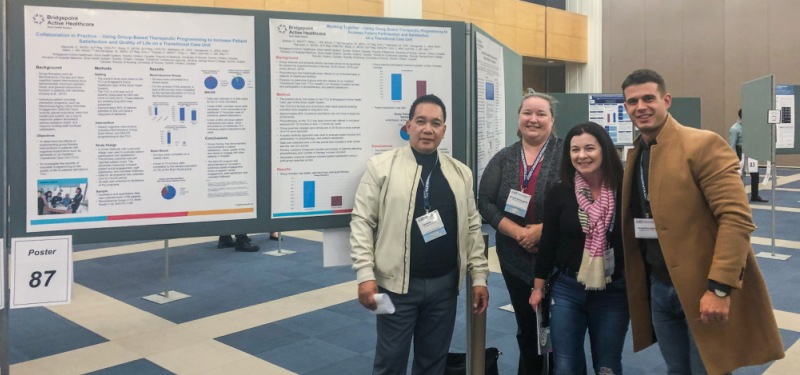
From left to right: Leo Alfaro, Patient Care Manager; Meredith McClenaghan, Occupational Therapist; Maureen Matheson, Communicative Disorders Assistant and Georgi Georgievski, Social Worker, represented Bridgepoint’s Transitional Care Unit at the Canadian Conference on Dementia.
Delivering high quality patient care and experience is at the core of everything we do. Our clinicians are in the best position to help deliver on that vision. At Bridgepoint, the Transitional Care Unit team has demonstrated this by working together, across disciplines to develop a new model of care for their patients. Last week they presented research posters about their work at the 10th biennial Canadian Conference on Dementia in Quebec City.
Bridgepoint’s Transitional Care Unit (TCU) provides care to a complex patient population. More than 60 per cent have cognitive impairment and many experience behavioural and psychological symptoms of dementia. Many patients rely on walkers or wheelchairs for their mobility and need support or assistance for activities such as eating, dressing or bathing.
“These patients no longer require the level of care provided in acute care or rehabilitation and are admitted to transitional care while waiting for a place in a long-term care home or other setting suited to their care needs,” says Georgi Georgievski, a Social Worker on the TCU and Chair of the TCU Research Group. “Because transitional care units are a relatively new concept in health care, there isn’t a lot of research on the best models of care,” he adds.
Leo Alfaro, the TCU Patient Care Manager, says the team tackled the challenge of developing a new model of care by looking at research and generating ideas for new programs and tools. “We developed a new model of care to ensure we’re providing quality care that supports patients’ well-being while they’re here in the hospital and help them make the transition smooth and successful,” he says.
Leo says participating at the conference “was an opportunity to showcase what we have accomplished–our successes and learnings, as well as a chance to meet and network with other professionals.” (See the sidebar for descriptions of the topics covered in the five posters.)
“In addition to presenting and sharing our work, we participated in discussions regarding emerging dementia care issues,” adds Meridith, McClenaghan, Occupational Therapist who also attended the conference. “We have brought back ideas and strategies to continue to improve patient care.”
Georgi hopes presenting at this conference is just the beginning. The team is working on submitting its first paper for publication in an academic journal. “We’re contributing to the evidence about transitional care units, an area of study where there are still a lot of knowledge gaps. This is what academic practice is all about.”
Research poster topics
- A checklist the care team uses to help match patients’needs with available resources on the unit on admission;
- Care team huddles to discuss the needs of patients experiencing behavioural and psychological symptoms of dementia;
- Group programs including mobility, cognitive and reminiscence programs;
- Introducing the MAUVE volunteer program to help keep patients with dementia cognitively stimulated and socially engaged; and;
- An educational program for the care team about understanding sexual expression in patients with dementia.
